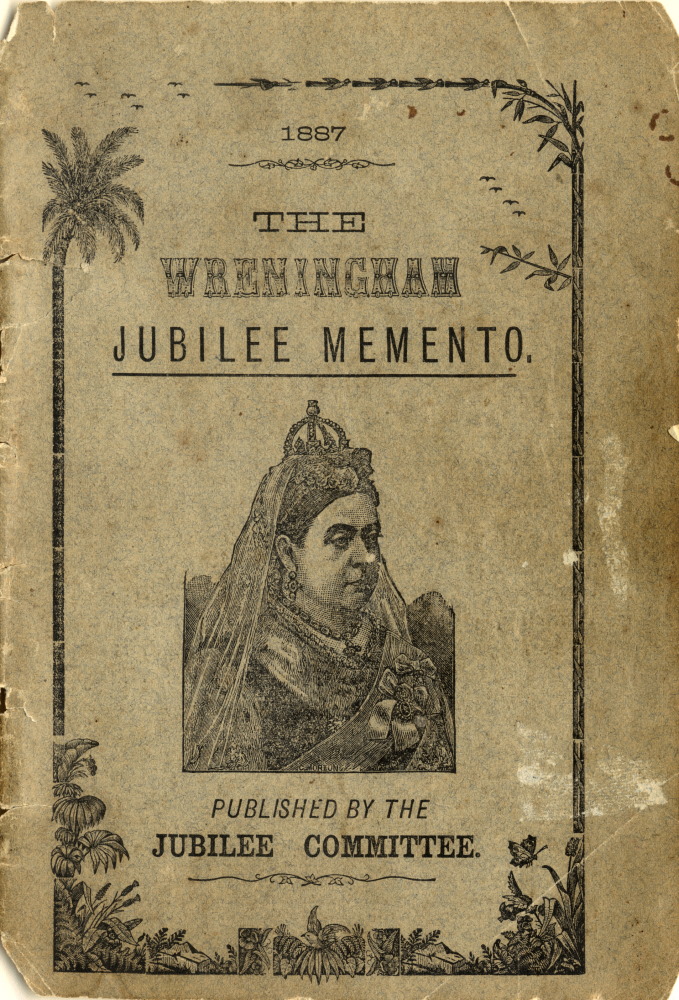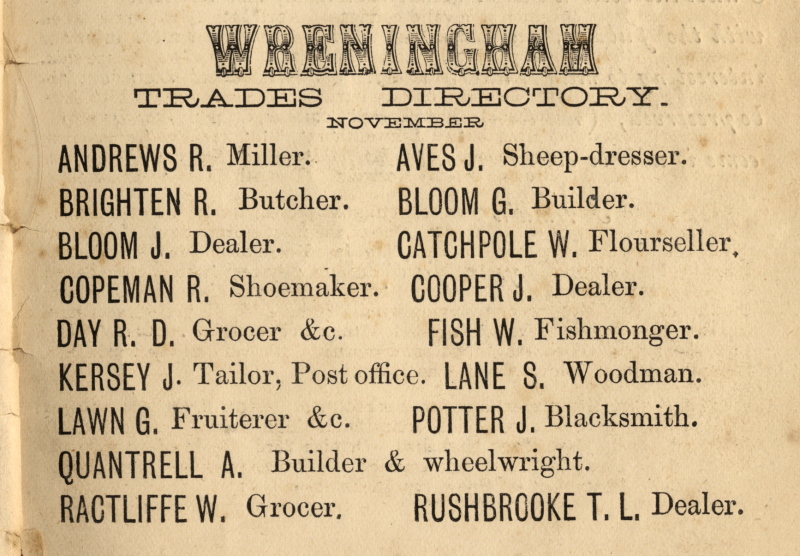
Queen Victoria’s Golden Jubilee was held in 1887 and there were celebrations across the land.
In Wreningham, an event planning meeting was held on Wednesday 27th April 1887 in the schoolroom. It included villagers: the Rev Upcher, Charles Hammond, S Mullinger, Dennis W Long, Thomas Rushbrooke, Robert Day, Robert Dennis Day, Henry Bothway, Alfred Quantrell and John Kersey.
It was decided to solicit funding for a celebration on the 21st June; this would include the provision of “a free meal” to every parishioner. A committee was selected and Robert Dennis Day was elected secretary.
On Thursday 12th May, Alfred Quantrell organised a fundraising event for family and friends in his barn, at Peartree Farm. The barn was “filled”. Robert Dennis Day was please to report that he had carried out all the associated printing free of charge!
The following planning meeting took place on the 24th May and it was decided that all the provisions for the 21st June event would be bought through the village tradesmen. A third meeting of the committee, a few days later, agreed to engage the services of Barham’s Band with its bandmaster – at a charge of £3.
On the day before the big event, a large tent was erected on the Rectory Grounds with the help of the village farming community – presumably this was the same site as the current sports-field? Members of the committee were prominent in the preparations – Alfred Quantrell provided the tables.
The entire village population was invited (433 men, women and children – not much different to today’s village population) and most are understood to have participated.
The day’s events got under way with a short church service, On leaving church, the congregation were met outside by the band which led the way to the rectory grounds. The meal (first, for the adults) comprised roast and boiled beef, plum pudding and ale. The children’s meal followed – with sandwiches, plum pudding and tea, after which, children and teachers were presented with medals by the Rev Upcher and his daughter.
Sports then commenced – with the winners presented with sweets for the children and tobacco for the men. (Presumably, the women didn’t do sport – although they were later thanked for the cooking!)
Nothing went to waste. The set tables had included 54 mustard glasses and spoons, 60 salts and spoons, 10 tins of Jubilee Biscuits – not to mention 94 yards of calico. All of these were included as sports prizes, too.
“Dancing was freely indulged in the the strains of Barhan’s band”. In the evening, the remainder of the food was consumed. Events concluded with “a fine display of fireworks” and everything was over by 11.30pm.
The committee had a final meeting on 4th July (in the schoolroom) to examine the accounts and make payments to the suppliers. The event’s budget was just over £35 – the published accounts tell us there was ten pence left over!
Some months later, Robert Dennis Day was presented with a “novel designed cabinet for writing materials” as thanks for his services to the village.
In November that year, a booklet (the link is to a complete copy) recording the Wreningham event was published by Robert Dennis Day and delivered around the village. Stapled into the booklet binding was a national booklet of the same size providing a brief history of the Royal family describing the story of Queen Victoria and her late consort. Somewhat bizarrely, the Wreningham element of the publication included a section headed: “Deaths in Wreningham 1870” but also listed many notable village events between the years of 1870 and 1887.

The booklet listed the names of all the householders living in Wreningham in 1887 plus all the tradesmen. A four page pull-out gave readers the price of flour in every year between 1847 and 1887. There was also a lot of advertising for Robert Dennis Day’s shop!
In the closing pages of his booklet, Robert Dennis Day remarked that his publication “will prove interesting to many …. in years to come, it may be more interesting than at present”. At least four paper copies of the booklet remain in the village, today. Maybe there are others? The contents have, indeed, proved very interesting as well as helping us fill a few more gaps in our village history.
